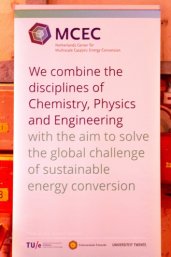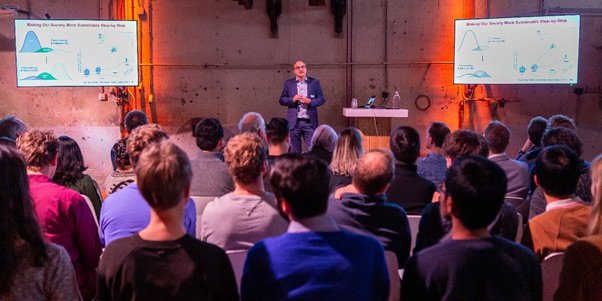MCEC Consortium Celebrates Five-year Anniversary
The Center for Multiscale Catalytic Energy Conversion (MCEC) celebrated its fifth anniversary with a scientific symposium on catalysis at De Fabrique in Utrecht.

MCEC is a consortium in which chemists, physicists, materials scientists and chemical engineers from Utrecht University, Twente University and Eindhoven University of Technology conduct research in the field of catalysis. With the help of catalysis, we can convert for example CO2 or municipal waste into usable materials for a more sustainable society. Catalysts ensure cleaner and more efficient chemical processes.
Collaborations and Impact
Because catalysis can be studied at different length scales, different scientific disciplines are involved in catalysis research. The main objective of MCEC is that chemists, physicists materials scientists and chemical engineers work together, both within and outside their own discipline, to find answers to important questions in the field of energy transition. Therefore, on 29 November this year, MCEC organized a scientific symposium where the MCEC community presented the latest state of their research to each other.
Presentations
Dr. Mathieu Odijk (University of Twente) kicked off the symposium with his research into micro-level catalysis by means of microreactors. Next, a new member of the MCEC scientific advisory board, Prof. Raffaella Ocone (Heriot-Watt University), spoke about improvements in chemical processes on an industrial scale. The following presentation by Prof. Jens Nørskov (Technical University of Denmark) gave inspiring insights to answer an important question in catalysis research: 'How do we make new catalysts for N2 activation?
Dr. Robin Geitenbeek (Utrecht University), Dr. Hai Le The (Twente University) and Katarina Stanciakova (Utrecht University) then presented their PhD projects from the first phase of MCEC. Scientific director Prof. Bert Weckhuysen (Utrecht University) concluded the day with a lecture on how spectroscopy and microscopy can be used to reveal chemical processes in catalysts.

Second phase of MCEC
With this symposium the first phase of MCEC came to an end. MCEC provides 40 positions for PhD students and postdocs in two phases of five years, whereby it can leave its mark on Dutch catalysis research and thereby contribute to the further international profiling of this important area of research. Furthermore, the community currently consists of 54 staff members, a management team of 7 professors and a scientific advisory committee of 8 leading international scientists.
The MCEC consortium is a gravity programme that was granted funding of ~ 32 million euro for personnel and facilities by NWO in 2014 for a maximum of ten years. This means that over the next five years, MCEC will be able to continue working on groundbreaking research in the field of catalysis.

